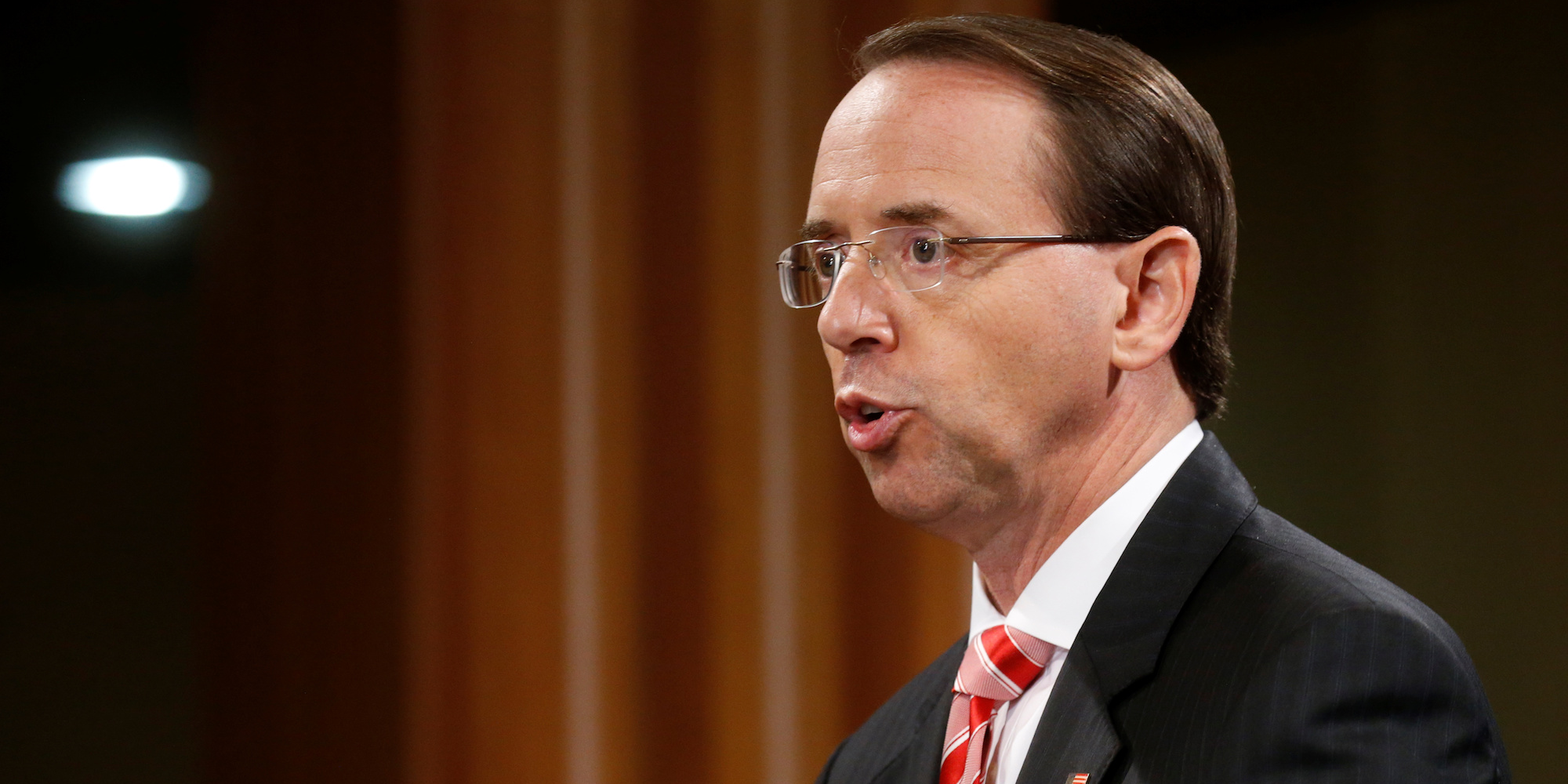- Deputy Attorney General Rod Rosenstein expected to be fired Monday, according to multiple reports.
- Axios reported that he’d verbally resigned Monday in a conversation with White House Chief of Staff John Kelly in anticipation of being fired by the president.
- But hours later, differing accounts emerged, and Rosenstein attended a regularly scheduled meeting at the White House.
- The White House said President Donald Trump and Rosenstein would meet in Washington on Thursday.
- The drama comes just days after The New York Times reported that Rosenstein had discussed wearing a wire to secretly record the president and invoking the 25th Amendment.
Deputy Attorney General Rod Rosenstein expected to leave his job on Monday, according to multiple reports. Hours later, however, he was attending a regularly scheduled meeting at the White House.
White House press secretary Sarah Huckabee Sanders said that at Rosenstein’s request, he and President Donald Trump had “an extended” conversation about recent news stories. Sanders said they would meet on Thursday when Trump returns to Washington from United Nations General Assembly events.
A frantic Monday morning left Rosenstein’s future – and that of the Russia investigation – uncertain. Some news outlets reported that Rosenstein was preparing to be fired by President Donald Trump, while others reported Monday morning that Rosenstein had met with the White House chief of staff John Kelly and resigned in anticipation of being fired by Trump.
The drama came just days after The New York Times reported Rosenstein had discussed wearing a wire to secretly record the president and invoking the 25th Amendment.
The reports immediately sparked a firestorm of concern that the president would move next to fire the special counsel Robert Mueller.
One current FBI employee, who requested anonymity when speaking about internal matters, said in reaction to the potential of Rosenstein's ouster: "Wow. Mueller's finished."
Democrats on Monday renewed calls for Congress to pass proposed legislation that would protect the special counsel and his investigation into Russian interference in the 2016 election and possible collusion between the Trump campaign and Russia.
Trump said during a Monday-morning interview with the conservative commentator Geraldo Rivera that he had not yet made a decision about whether to get rid of Rosenstein, who oversees the special counsel's investigation into possible collusion between the Trump campaign and the Russian government.
"I don't want to comment on it until I get all the facts," the president said of the reports about Rosenstein's conduct. "If anything took place, and I'll make a determination sometime later."
The question of whether Rosenstein would be fired or resigned would have significant implications because it would affect whether Trump could hand-pick the next deputy attorney general. The Federal Vacancies Reform Act of 1998 gives the president the authority to temporarily appoint an acting official to a federal agency position if the current official "dies, resigns, or is otherwise unable to perform the functions and duties of the office."
But the law is much less clear about the president's ability to fill a post if the previous occupier was fired.
WATCH: @PeteWilliamsNBC provides his analysis and insights after Deputy AG Rosenstein is summoned to the White House. pic.twitter.com/vVYBJJsXYe
— MSNBC (@MSNBC) September 24, 2018
Rosenstein first raised the question of the 25th Amendment and considered wearing a wire in the spring of 2017, The Times said, citing sources in the Department of Justice and FBI who were present in conversations with Rosenstein or were briefed on memos that the former FBI Deputy Director Andrew McCabe wrote about Rosenstein.
But The Washington Post later reported that Rosenstein's comment about wearing a wire was made sarcastically, after McCabe had pushed for the DOJ to investigate Trump.
Rosenstein issued a broad denial of The Times' reporting, calling the story "inaccurate and factually incorrect" and said in a statement to The Times that, based on his "personal dealings" with the president, there's no basis to remove him from office.
Rosenstein also claimed that the anonymous sources cited in the story were motivated by anti-DOJ sentiment and their "personal agenda."
Immediately following the publication of the Times story last Friday, some of Trump's favorite far-right influencers, including Fox News hosts Laura Ingraham and Jeanine Pirro, called for Rosenstein's immediate firing. Other Republicans, including lawmakers in Washington, urged caution and discouraged the president from taking the report seriously.
"When it comes to President @realDonaldTrump..... BEWARE of anything coming out of the @nytimes," Republican Sen. Lindsey Graham tweeted.
Trump has regularly targeted both Rosenstein and Attorney General Jeff Sessions since Mueller was first tapped in May 2017 to oversee the FBI's investigation into possible collusion between the Russian government and the Trump campaign, as well as possible obstruction of justice committed by the president when he fired FBI Director James Comey last year.
